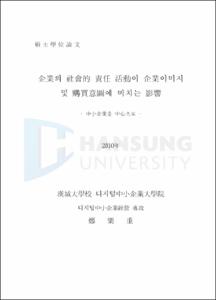직업전문학교 조리교육생의 기본심리욕구가 진로성숙 및 행동의도에 미치는 영향
- Type
- Thesis
- Alternative Title
- -자기조절을 조절효과로-
- Advisor
- 허진
- Department
- 경영대학원 호텔관광외식경영학과
- Issued Date
- 2020
- Publisher
- 한성대학교 대학원
- Appears in Collections:
- 디지털중소기업경영학과 > 1. Thesis
- Files in This Item:
-
-
Download
 000000564268.pdf
기타 데이터 / 825.32 kB / Adobe PDF
000000564268.pdf
기타 데이터 / 825.32 kB / Adobe PDF
-
Items in Repository are protected by copyright, with all rights reserved, unless otherwise indicated.